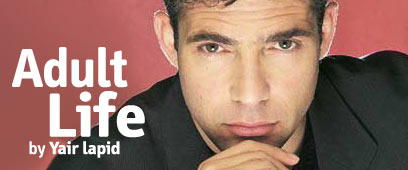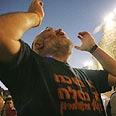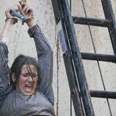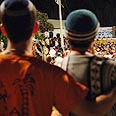



Here and there, attempts were made to commemorate the event. On Yom Kippur eve, for example, Rabbi Yuval Sherlo published an article in which he tried to remind us, almost desperately, that Gush Katif residents deserve an apology.
In another example, addressing a conference on the media at the Bar-Ilan University, David Landau was the first editor to admit that his newspaper, Haaretz, chose to turn a blind eye on corruption suspicions against the Sharon family because, according to him, "a small corruption (bribery) is preferable to a big corruption (the occupation)."
Reports on serious malfunctions in the evacuees' rehabilitation process bring out some sympathy, but they do not seem any sadder or more uncalled-for than any other Israeli distress. The evacuees are up there, together with the single mothers, the sick whose medicine was left out of the health basket, and the residents of Kiryat Shemona who dig in the rubbles that used to be their home on TV cameras. Well, being a Jew ain't easy.
Do we not care?
Still, it is strange. After all, it was a turning-point event that put us - for the first time since the Altalena - on the verge of civil war. What happened that demoted this event to the level of a photo exhibition in the Tel Aviv Museum? Do we not care about what happened to the weeping settler girls, or the boys who fenced themselves inside the seaside synagogue?
It feels like the political debate that crossed every boundary has been stored away in one of the empty containers at the Erez crossing. It sometimes seems that the national-religious public is shocked by the fact that the disengagement vanished from the Israelis minds more than they were shocked by the disengagement itself.
We can understand them because, one year later, the main question is still unanswered. What really happened there? Why was it so important? Why was it so urgent? Was it worth the risks that the Israeli society was willing to endure? The depressing answer is that we do not know.

Pullout (Photo: Hagai Aharon)
We do not have a single version that all Israelis can accept. There is no single explanation. Naturally, there is total disagreement concerning the results of the moves. The 33 interviews with left- and right-wing persons, published in Ari Shavit's book "Dividing the Land," mainly left the impression that the disengagement and its reasons has 33 different versions, or rather - not one.
The interesting part is the fact that everyone - from Yosi Beilin, through Binyamin Netanyahu and Ami Ayalon, to Yaacov Amidror - criticized the move, its timing, and certainly the way it was done, but this did not make any of them try to stop it. The State of Israel, which was unable to privatize the Electricity Company, was impressively effective when it performed a move that no one fully understood.
Time for reexamination
Now, that the disengagement is no longer a central issue in our lives, now that it is no longer an acute emotional event, it is perhaps the time to reexamine it. The Israeli Government stated it was a "national necessity," but never bothered to explain what that necessity was exactly.
Ariel Sharon once took me up to the famous room at the top of his ranch tower and showed me the view of Gaza from there. "I sat in this chair," he said, "looked out there, and realized that we have to get out of there." Sharon enjoyed such demonstrations. He loved presenting himself as a simple farmer, which was meant to make everyone understand that he is actually a clever and open-minded statesman.
Still, it was not convincing enough. Even those who supported the move with all their hearts could not really understand its timing, urgency, or the great effort it involved. The history of the Israeli-Palestinian conflict had much better points in time when giving back territories was more appropriate. The fact is that the State of Israel ignored them quite successfully.
It happened because of the settlers
Incidentally, the settlers maintain that the entire affair begins and ends with the police investigations against the Sharon family members. This is absurd primarily because even in Israel not every problem can be personified, and secondly because - though some of us would rather forget that - the disengagement was endorsed by the Knesset majority and by every public opinion poll conducted.
Having the perspective of one year and one war, I would like to offer a different theory: It did not happen despite of the settlers, but because of them.
It had nothing to do with the Palestinians, demography, the desire to make peace, the relative feebleness of the IDF, or any other explanation that was given. There was a totally different motivation behind the disengagement.
It had to do with the fact that we lost the delicate balance between the Israeli society and the settlers' society, a relationship that Aba Kovner once finely described, saying: "The secular Israelis need the religious to have some roots, while the religious need the secular to have a nation."
Over the past 20 years, the national-religious made extensive use of the secular nation in their efforts to attain a series of political, mainly religious, goals. "The majority of the Yesha residents," Rabbi Yoel Bin-Nun recently wrote in a somber article, "mainly their rabbis, truly believed that they are headed toward redemption, riding on Sharon's back as if he were the Messiah's donkey."
The thing is that the Israelis do not like being viewed as donkeys, regardless of who rides them. The famous "pendulum principle" is very active in the Israeli political reality.
Remember Galileo?
When Galileo discovered it, in 1602, it seemed so simple that it is a wonder no one thought of it sooner. According to this principle, the farther you push a pendulum in one direction, the stronger it will swing back.
This concept has been proven here time and again: The shock of the Holocaust created the Jewish state; the corruption of the governing Mapai Party created the shockwave that gave Begin's Likud the helm; the never-ending ultra-Orthodox extortions gave birth to the Shinuy Movement; the Oslo accord got Rabin murdered; intoxicated with power, the Likud lost the last elections to Kadima; and so on. The pendulum will forever swing the other way.
The national-religious - as people who are certain they are right always do - failed to fully grasp the hostility that was building up in the secular public against the illegal outposts: Jewish underground groups; the way single-minded settler activists seized mid-level positions in the Housing, Construction, and Transportation Ministries; the bypass roads built in the territories; the settlers' violence against the police and the army; their disrespect toward the courts; and - justly or not - the Israelis raged against the assassination of a prime minister as a political tool that was meant to change the course of history.
Some of the issues mentioned above may be more myth than fact, but it did not matter because the secular Israelis were angry and losing their patience. The accentuated settlers' arrogance played its part too.
Rabbi Levinger's slightly ludicrous and avant-garde movement turned, over the years, into a predatory group that made it clear - in more than one way - that it is superior to all other Israelis in terms of its values and ideology.
Influential pundits such as Uri Orbach urged the religious to "infiltrate the media." A senior IDF officer such as Major General (Res.) Yaacov Amidror dared ask: "Other than speaking Hebrew, how are the secular Jewish? You say you live here? The Arabs live here too and it does not make them Jewish."
These remarks clearly show that the national-religious viewed the secular Israelis as an enemy whose ranks they should infiltrate and whom they openly scorn.
At the same time, another myth was created in Yesha: The secular public is too feeble. Tel Aviv is an elitist, hedonist, left-wing bubble. The secular are losing their "Israeli spirit." While feeling traditionally superior, the second generation of the national-religious started believing another myth. We can go on doing our thing, the rabbis and their disciples told themselves. The secular will do nothing about it for they have no God in their hearts.
No accident
The thing is that the secular public eventually did something. Not willingly, but it did. The Israeli democracy realized - instinctively more than through some conscious process - that it cannot afford to be led by the nose by a militant minority group.
It was no accident that the secular right did not side with the settlers in that conflict. It was no accident that the Israelis, who almost automatically voted for right-wing parties for the past 30 years, showed a steady 70 percent support for the disengagement process.
Looking at the famous aerial photos of the gathering in Kefar Maimon and the demonstrations on Rabin Square in Tel Aviv, it is very hard to find an uncovered head. Everyone was donning yarmulkes.
Reporters who covered the events at the time quickly found out that it is best to visit Gush Katif on Saturday. While imposing a strict closure on the region all week long, the IDF rarely bothered to man the roadblocks on the Sabbath, knowing there are no secular Israelis who might join the settlers' struggle.
That confrontation never crossed its original boundaries, leaving the national-religious on one side and the rest of the Israelis on the other. The Yesha rabbis and civilian leaders raged and fumed about this time and again, perhaps because they missed the clue, or perhaps because they were the only ones who understood this.
In fact, the national-religious were the only public group that tried to discuss the problem. The old assertion by Rabbi Yoel Bin-Nun ("we failed to settle in the hearts of Israelis") became timely again,.
The second paragraph (which no one ever got to, of course) in Pinhas Walerstein's famous letter that called on the national-religious soldiers to refuse orders, stated: "The new and illegitimate government that is being currently established has managed to bridge the gap between the Likud and Labor with a single desire to uproot settlements and expel Jews from their land."
Certainly, "desire" is an incorrect term, but at least Walerstein removed the Palestinians from equation, openly telling his supporters: It is against us. We are the issue. They do not want to disengage from Gaza; they want to disengage from us.
The fact that the settlers tightly closed ranks - in a self-imposed move that was almost totally successful - is a classic example of the way radical movements behave when crisis looms, believing that "the world is all against us."
The truth…
The truth is that no one wanted to disengage from them. The Israelis merely felt that the settlers should be taught a lesson in humility and perhaps in democracy too. The Gaza Strip was not chosen by accident either.
It is a region devoid of any major religious importance, its Jewish inhabitants were more national-religious that ultra-Orthodox fanatics, and Israel can rid itself of it without causing a rift between the state and 250,000 of its residents.
By similar logic, Israel could let Shas return to the government after a "cooling period" of a few years, or forgive Labor Party for the Yom Kippur War mishaps. It did not want to give away one of the major segments of its public, and still does not, only because it "pulled the cart" a bit too far.
One year later, it seems that we can start the rehabilitation process. One thing we can say to the credit of yeshiva students is that they learn fast. Despite the outrage demonstrated when Amona was evacuated, no mass protest movement was ever really born, hesder yeshiva students are joining the army regularly, and people watch their tongues more than before. Things are back in balance.
At the same time, when the disengagement is examined with secular tools - political, strategic, and demographic - it does not look too good, certainly not as long as Kassam rockets keep falling on Sederot and Ashkelon. All of us, however, learned a lesson here. The public in general learned that we need to make peace arrangements, and the settlers learned that their power is limited.















